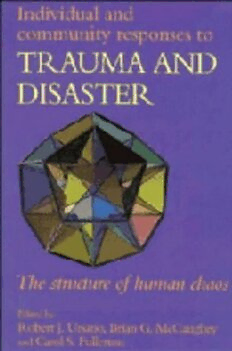
Individual and Community Responses to Trauma and Disaster: the Structure of Human Chaos PDF
436 Pages·1994·6.704 MB·English
Most books are stored in the elastic cloud where traffic is expensive. For this reason, we have a limit on daily download.
Preview Individual and Community Responses to Trauma and Disaster: the Structure of Human Chaos
Description:
Coping with disaster is an overwhelming and often baffling task for survivors, rescue workers, and clinicians. This volume looks in depth at how people experience trauma and suggests practical strategies for treatment. The authors examine issues ranging from the biological basis of posttraumatic stress reaction to the psychosocial and fictional construction of terror, and disasters ranging from random acts of violence to war. From Chernobyl to Desert Storm, from Kentucky floods to Norwegian avalanches, the authors explore the effects of trauma on adults and children. They find certain commonalities in human response to disasters of all kinds, and hold that by understanding these partially predictable patterns of reaction, mastery of chaos, and finally recovery can occur. Based on their comprehensive analysis, they suggest disaster intervention strategies that emphasize recognition of the psychological effects of trauma, as well as preparedness and prevention.
See more
The list of books you might like
Most books are stored in the elastic cloud where traffic is expensive. For this reason, we have a limit on daily download.
